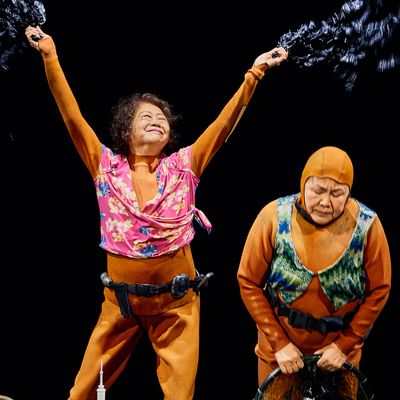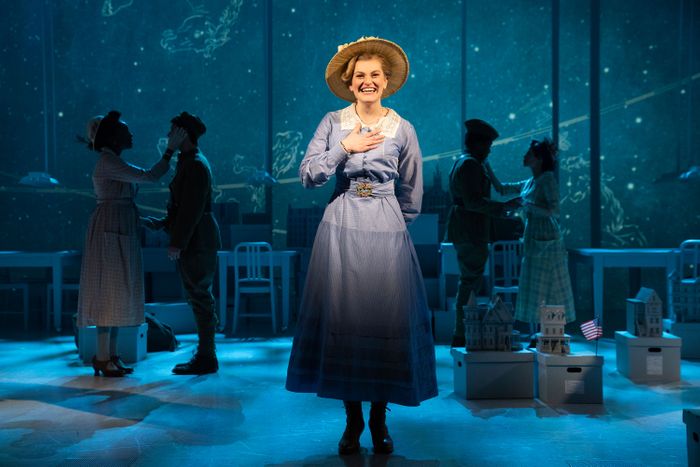
Not to get morbid just when you’re thinking nervously about “large groups” and “social distancing,” but a theater is a great place to consider death. The two are connected: the audience’s twilit silence, for instance, and that “in-the-doorway” feeling that you get from hearing old minds speaking through new mouths. Shows themselves are so fleeting that we enter a theater ready to think in terms of ephemerality. And so there’s something beautifully appropriate about the form of both Celine Song’s Endlings and the new musical Unknown Soldier. In each, the production sets itself up as a cenotaph to something that recedes as we watch—they’re memorials made out of granite that vanishes.
In Song’s Endlings, the playwright pays tribute to the haenyeo, Korean diver-women, whose way of life by the ocean is dwindling away. Song has written a tragedy full of humor and rude life that’s all about these women’s one-way trip: “Who will inherit my life?” wonders Sook Ja (Jo Yang), and the answer is no one. In Endlings, Song isn’t talking about continuation: There’s no ebb and flow, here—only ebb. The play, wildly uneven though it is, is clear-eyed about the way things disappear. When they go, they go.
The most powerful sequences take place at the seaside, in set designer Jason Sherwood’s evocation of a rocky Korean island. Director Sammi Cannold has stage management pop in to spritz extra fog into the air when necessary, and the spirited silliness of this actually emphasizes the brutality of their surroundings, the way the cold sea is at their backs the moment the tech crew leaves. Han Sol (Wai Ching Ho), Go Min (Emily Kuroda) and Sook Ja all go about their work-filled day, clambering in and out of wetsuits, cursing liberally and generally disabusing us of any cute-old-lady stereotypes we might have had. They’re strong and vital and so poor, Sook Ja says, that they’re the “dirt eaters.” The trio—each one is a comic dynamo—is thrillingly good at letting us see the little fear that sits underneath their large courage; every moment we spend with them is gold.
Endlings has another component, though, an autobiographical portrait of the writer working on a play, the sort of metatheatrical touch that can bend a piece out of shape. Jiehae Park plays Ha Young, a “Korean-Canadian Manhattanite in her late twenties” who can’t finish her play about the haenyeo. The difference between these sections and the other stuff is striking. All the assembled parties suddenly collapse: Cannold’s direction turns from imaginative and imagistic to listless; the writing thins to mere self-regard; Park’s performance simply isn’t on the same level as the three ladies swimming around in the onstage tank, wringing dignity out of their orange rubber suits. There’s a sharp satirical sequence about the white theater that so bores and exhausts Ha Young, and that, to be fair, does do its job. The playwright-in-Manhattan time-wasting makes us truly yearn to get back to the island and the haenyeo and their nets and today’s catch. They keep telling us that they’re on the brink of extinction, and in this short play, surely we don’t have time to spend on anything else.
Unknown Soldier is one of the last pieces written by the musical theater composer Michael Friedman, who died in 2017. Those of us who knew Michael, those of us who valued his work, those of us who can’t distinguish between those categories—all have been eager to see the projects he was working on before his death. Some are coming slowly to light. The show Unknown Soldier, co-written with bookwriter-and-lyricist Daniel Goldstein, is about memory and loss, but in this case, it’s the actual fact of the production that stands as memorial. Outside Playwrights Horizons, there’s a picture of Friedman with his arms around his collaborators, laughing hugely. In Endlings, we see a Korean funeral ceremony in which the bereaved walk past a formal portrait of the dead. Going into the Playwrights lobby past Michael’s picture, I thought of that.
In an otherworldly gray archive (the everywhere-is-nowhere set is by Mark Wendland), we meet a rather frazzled modern-day OB-GYN named Ellen (Margo Seibert). She has come home to Troy to clear out the house her extremely old grandmother Lucy (Estelle Parsons) has bequeathed her. She’s hardly delighted to be back in “the worst town in New York,” and she sometimes spots her younger self (Zoe Glick) out of the corner of her eye. In a cupboard, she finds a clipping from 1918, which seems to show Lucy as a young woman (Kerstin Anderson) having a picnic with a man Francis (Perry Sherman) called, in the caption, the Unknown Soldier. Curious, Ellen emails a random “info” address at Cornell—this part is a bit vague, as is the overarching timeline here—and she reaches Andrew (Erik Lochtefeld), a lost but helpful soul who immediately leaps into tracking down the mystery. Ellen and Andrew email back and forth, reconstructing what they think happened. Lucy has, the flashbacks tell us, fallen in love with a soldier going to the front, married him in a night, lost him to the trenches, and tried to reclaim him at a New York asylum, where the amnesiac Francis becomes the focus of her desperate romantic attention. Young Lucy isn’t the only one with at-a-glance obsessiveness; Andrew decides that he too deserves a great love, and he shows up at Ellen’s door.
For those keen to hear Friedman’s voice again, Unknown Soldier seems to offer only quick moments of it. Now, that can’t actually be true. According to Goldstein’s painful program note, all the music is Friedman’s. But there’s surprisingly little of Friedman’s rapid-fire jokiness here, scarcely any of his usual pastiche smorgasbordianism, and scant evidence of his love for swooning melody. There are a few hints here and there. He loved vaudeville, so it does feel very Friedmanian that a doctor springs forward with three patients to sing an upbeat song about the three types of amnesia, and there are rhymes that might remind you of him; sparky little timebombs in the lyrical structure. But the music eventually settles into a kind of placeholder recitative sound, even at moments of apparent climax. Where are those Friedman songs? He was always fiercest and best when writing a song that said love is nine-parts loneliness: “Love is a Gun,” in his Love’s Labour’s Lost, or the last passenger pigeon’s lament in The Great Immensity, or “Wide Sargasso Sea” in Gone Missing. In this show, that song clearly hadn’t struck him yet.
Goldstein’s story is self-defeating—a revelation at the end makes the whole thing a paradox, I think, though I can’t actually work it out. There’s a deep unacknowledged creepiness to several of the characters involved too: After Andrew cheerily stalks Ellen (she does throw him out, though without fear), he has a grand revelation song in which we learn he’s done this sort of thing before. And what Lucy does to Francis—a man terribly lost in mental suffering—is assault. (How such an uncanny creature grows up to be the extremely cool Estelle Parsons is never clear.) Director Trip Cullman and the actors smooth over as much of this as they can. Lochtefeld spends his whole performance radiating “not a threat” vibes, though this means he and Seibert (in beautiful voice here) are a bit tedious in conversation. Had Friedman lived, perhaps this confusion about what is sweet and what is awful would have developed into something spiky, provocative and strange. Is all romance just … misremembering? You can imagine the musical that would ask such a thing—but that work was never finished.
Endlings is at New York Theatre Workshop through March 29.
Unknown Soldier is at Playwrights Horizons through March 29.



